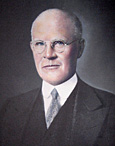Charles Rudolph Walgreen
Charles Rudolph Walgreen (October 9, 1873 – December 11, 1939) was an American businessman and the founder of Walgreens, one of the largest pharmacy chains in the United States. His innovative approach to the pharmacy retailing business transformed the industry and laid the foundation for the modern drugstore concept.
Early Life[edit | edit source]
Charles R. Walgreen was born in Knoxville, Illinois, to Swedish immigrants. After an accident that resulted in the loss of part of a finger, Walgreen was forced to give up work in a shoe factory. This incident led him to pursue a career in pharmacy. He moved to Chicago, where he worked as a pharmacist's apprentice before attending the Chicago College of Pharmacy.
Career[edit | edit source]
In 1901, Walgreen purchased his first drugstore in Barrett's Pharmacy in Chicago. He was innovative in his approach to business, introducing bright, clean, open stores, and was among the first to put the pharmacy counter at the back, encouraging customers to browse and buy other items. Walgreen also introduced the concept of selling merchandise at a fixed price, which was not common at the time.
Walgreen's pharmacies also became known for their excellent customer service and high-quality products. He introduced the malted milkshake in 1922, which became a popular item and drew more customers into his stores. By 1929, there were 525 Walgreens stores across the United States.
Innovation and Expansion[edit | edit source]
Charles Walgreen was a pioneer in the retail pharmacy industry. He implemented several innovative strategies that contributed to the growth and success of Walgreens. These included manufacturing his own line of pharmaceutical products to ensure quality and reduce costs, as well as establishing ice cream manufacturing plants to supply his stores with malted milkshakes.
Walgreen's strategy of opening stores in high-traffic areas and offering a wide range of products, including cosmetics and household items, in addition to pharmacy services, helped to redefine the drugstore as a one-stop shopping destination.
Legacy[edit | edit source]
Charles R. Walgreen's vision and entrepreneurial spirit transformed the pharmacy industry. His emphasis on quality, customer service, and innovation set new standards for retail pharmacies. Today, Walgreens is one of the largest drugstore chains in the United States, with thousands of locations across the country. Walgreen's legacy lives on through the company's continued commitment to providing accessible healthcare and a wide range of products and services.
Walgreen was also known for his philanthropy, contributing to various causes and supporting the communities in which his stores operated. His contributions to the pharmacy industry and the American retail landscape were significant, making him a key figure in the history of American business.
Death[edit | edit source]
Charles R. Walgreen passed away on December 11, 1939, leaving behind a legacy that would continue to grow and influence the retail pharmacy industry for generations.
Search WikiMD
Ad.Tired of being Overweight? Try W8MD's physician weight loss program.
Semaglutide (Ozempic / Wegovy and Tirzepatide (Mounjaro / Zepbound) available.
Advertise on WikiMD
|
WikiMD's Wellness Encyclopedia |
| Let Food Be Thy Medicine Medicine Thy Food - Hippocrates |
Translate this page: - East Asian
中文,
日本,
한국어,
South Asian
हिन्दी,
தமிழ்,
తెలుగు,
Urdu,
ಕನ್ನಡ,
Southeast Asian
Indonesian,
Vietnamese,
Thai,
မြန်မာဘာသာ,
বাংলা
European
español,
Deutsch,
français,
Greek,
português do Brasil,
polski,
română,
русский,
Nederlands,
norsk,
svenska,
suomi,
Italian
Middle Eastern & African
عربى,
Turkish,
Persian,
Hebrew,
Afrikaans,
isiZulu,
Kiswahili,
Other
Bulgarian,
Hungarian,
Czech,
Swedish,
മലയാളം,
मराठी,
ਪੰਜਾਬੀ,
ગુજરાતી,
Portuguese,
Ukrainian
Medical Disclaimer: WikiMD is not a substitute for professional medical advice. The information on WikiMD is provided as an information resource only, may be incorrect, outdated or misleading, and is not to be used or relied on for any diagnostic or treatment purposes. Please consult your health care provider before making any healthcare decisions or for guidance about a specific medical condition. WikiMD expressly disclaims responsibility, and shall have no liability, for any damages, loss, injury, or liability whatsoever suffered as a result of your reliance on the information contained in this site. By visiting this site you agree to the foregoing terms and conditions, which may from time to time be changed or supplemented by WikiMD. If you do not agree to the foregoing terms and conditions, you should not enter or use this site. See full disclaimer.
Credits:Most images are courtesy of Wikimedia commons, and templates Wikipedia, licensed under CC BY SA or similar.
Contributors: Prab R. Tumpati, MD

